Hyderabad: The historic Aza Khana-e-Zehra saw many devotees coming for ziyarat. The building was constructed in the 1930s by the last Nizam of Hyderabad, Mir Osman Ali Khan.
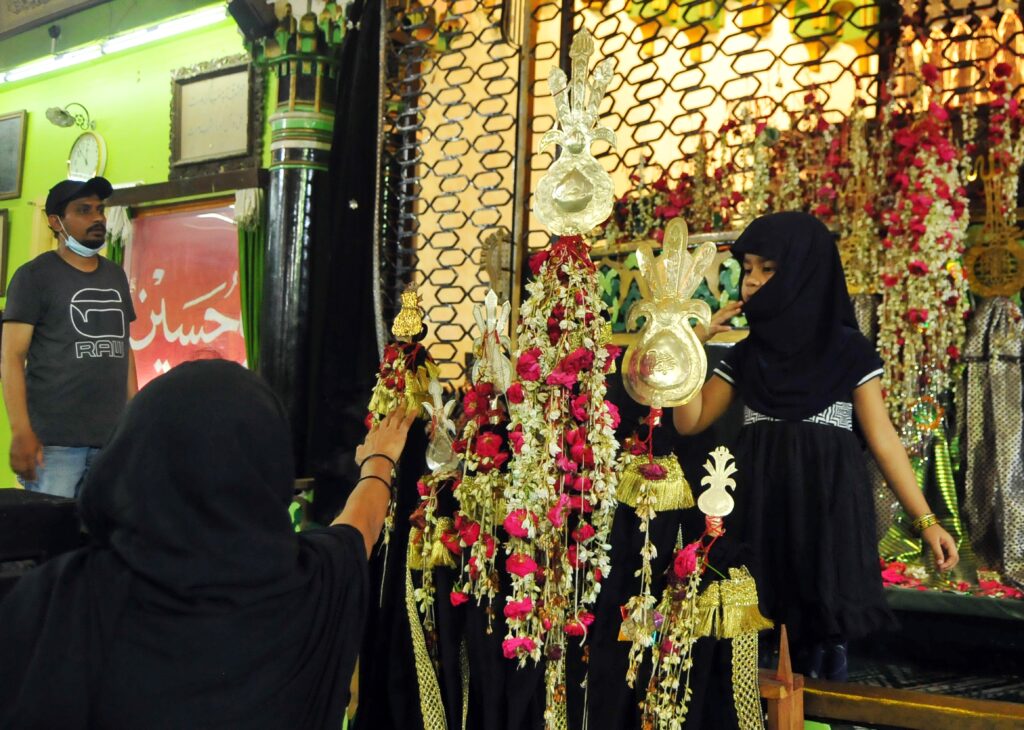
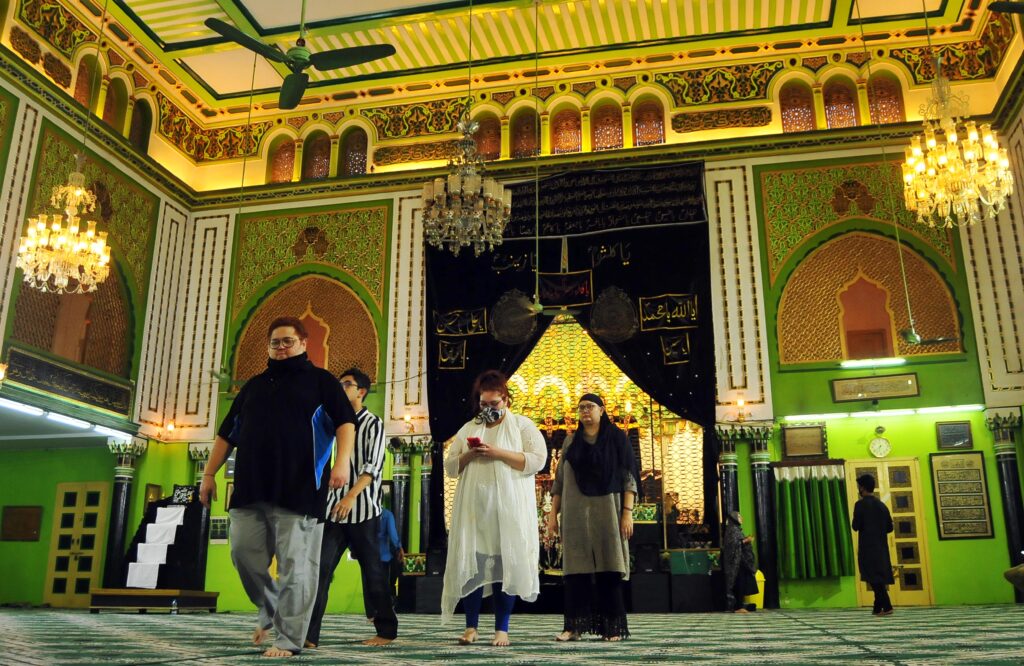
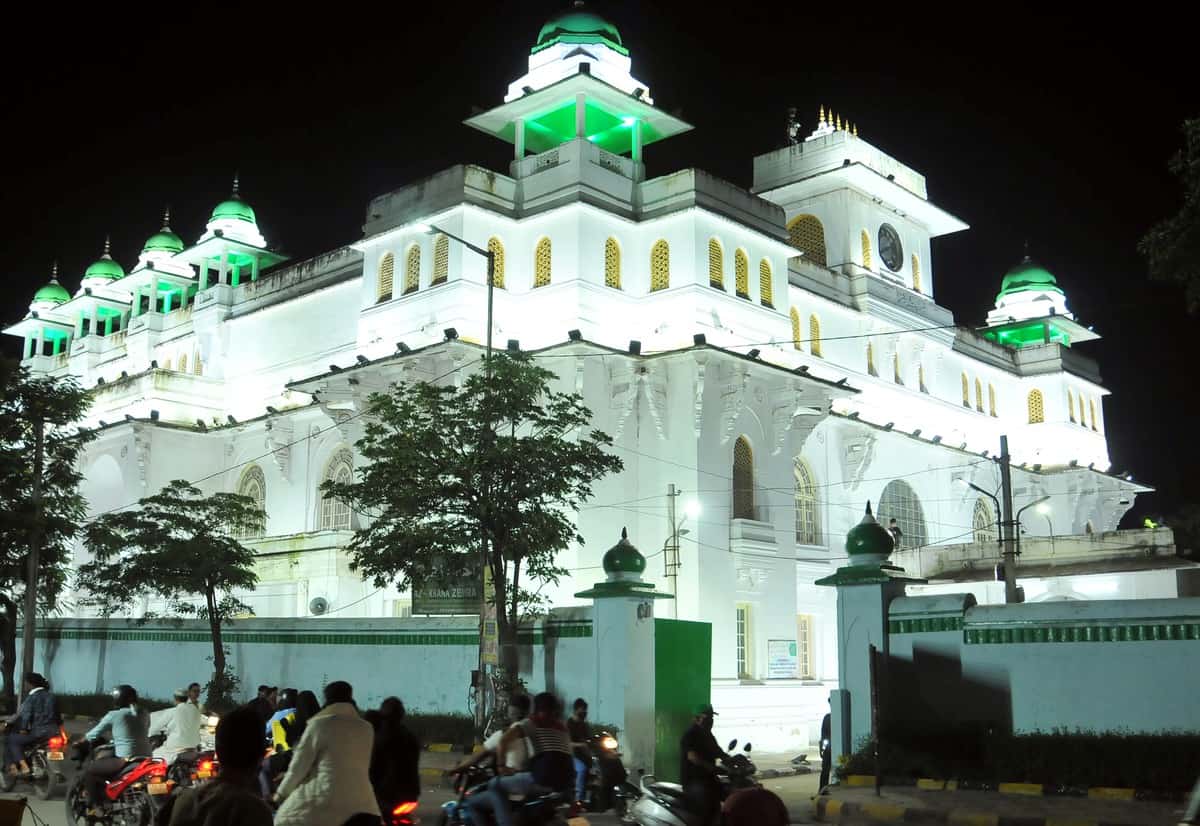
Hyderabad: The historic Aza Khana-e-Zehra saw many devotees coming for ziyarat. The building was constructed in the 1930s by the last Nizam of Hyderabad, Mir Osman Ali Khan.



The carrying of ‘tazias’ at Muharram in Delhi has been undertaken since medieval times but this will be the first time for 700 years that processions will not be carried out, said Syed Kashif Nizami, the custodian of the revered Hazrat Nizamuddin Auliya shrine.
“Even during the Partition in 1947, there was no ban on ‘tazia’ processions in the dargah, but this time due to the corona pandemic, Delhi and the Central government have not allowed processions to be held in a mass religious programme.”
“For more than 700 years, the largest ‘tazia’, decorated with flowers, is kept in the Imambara, which is at a small distance from the dargah. More than four ‘tazias’ decorated with flowers are kept here.”
On the 10th day of Muharram, which marks the martyrdom of Hazrat Imam Hussain, the grandson of the Prophet at Iraq’s Karbala in 681 A.D, a procession with mourners carrying daggers and knives is carried out from the dargah and the blood oozing out of their self-inflicted wounds is reminiscent of the tragedy.
However, this time around, all such activities have been banned due to the pandemic. So this time only ‘tazias’ decorated with flowers will be sent to Karbala in the capital.
Gauhar Asghar Kasmi, a member of Shah-e-Mardan Dargah and Anjuman Karbala Committee at Aliganj Jorbagh in Delhi, said: “Every year, the ‘majlis’ starts from the first day of Muharram. Tazias are also kept at many places. On the 10th day of Muharram, processions reach here with nearly 70 large tazias. Tazias are buried here. A procession of mourners beating their chests take to the streets on Teej, the 12th day of mourning. ‘Majlis’ are being organised this year only in the Imambaras. People are allowed to participate in the Majlis with observance of social distancing norms.”
Hindu-Muslim unity is also at display every year on Muharram.
Mohammad Zuhaib Nizami, who is associated with Hazrat Nizamuddin Auliya Dargah, said: “Many Hindu families in the vicinity have been part of the ‘tazia’ processions for many years owing to their faith. A Hindu family in Mehrauli has been doing so for many decades.”
The coronavirus has also affected the life of people involved in the business of ‘tazia’. ‘Tazias’ are made in thousands in Delhi, but this time due to corona, people are not buying ‘tazias’ for ‘aqidat’ (goodbye prayers).
Courtesy: National Herald
https://www.nationalheraldindia.com/india/for-first-time-in-700-years-no-tazia-processions-in-delhi
Jordan: Jordan-based Royal Islamic Strategic Studies Centre (RISSC) has released The 2020 Edition of the Muslim 500 naming 500 Influential Muslims of the world.
Leading scholar of Hadith, Islamic jurisprudence and Islamic finance Justice Sheikh Mufti Muhammad Taqi Usmani tops the list, while, Pakistan’s Prime Minister Imran Khan is named the ‘Man of the year’, and US Congresswoman Rashida Tlaib has been named ‘Woman of the year’.
Ayatollah Khamenei the second Supreme Leader of the Islamic Republic of Iran is on second number. Turkish president Recep Tayyip Erdogan is on 6th number. Saudi Crown Prince Mohammed bin Salman is on 24th position.
Indian Islamic Scholar Maulana Mahmood Madani is on 28th position. Noted Pakistani scholar Maulana Tariq Jameel is on 36th position.
In The 2020 Edition of the Muslim 500 (The World’s 500 Most Influential Muslims), the first 50 persons are religious leaders and chiefs of the states while the remaining 450 persons belong to 13 other fields including politics, social and media fields.
Under the head Administration of Religious Affairs, the list also mentions eight other Indians including Shaikh Abooobackar Ahmed, Sayyid Ibrahimul Khaleel Al-Bukhari, Maulana Saad Kandhalvi, Mufti Abul Qasim Nomani, Maulana Shakir Ali Noorie, Hyderabad MP and MIM president Asaduddin Owaisi and Maulana Zuhair ul Hassan.
Source: Siasat
NEW DELHI: The Civil Services exam 2019 results have been announced by the Union Public Service Commission (UPSC).
The coveted Civil Services Examination result has thrown a number of rags to riches stories.
Earlier in 2016, an autorickshaw driver’s son from Jalna, Ansar Ahmad Shaikh, made headlines after he cracks the UPSC in his first attempt and becomes the youngest IAS officer till date.
This year, many inspiring , positive, uplifting stories have been appearing in the newspaper.
Azharuddin Zahiruddin Quazi is also one among the candidates who has successfully cleared the 2019 UPSC examination .
Son of Zahiruddin Quazi, a taxi driver in Yavatmal area of the Vidarbha region of Maharashtra, Azharuddin brought laurels by securing AIR- 315.
Azharuddin’s parents have non-degree status. His father is non-matriculate and his mother Meraj is a Class 10 passout.
Despite having financial difficulties, his mother focused on providing quality education to her children.
Azaharuddin and his sibling are all qualified professionally.
One of his sibling has completed MBBS. Second is Chemical Engineer and third a Lawyer. Azharduddin himself is a National Colour Holder in Handball.
A graduated in Commerce from Yavatmal, Azharuddin got selected as a Probationary Officer in Corporation Bank where he served for 6 years before appearing for UPSC.
Azharuddin gets free coaching for the preparation of the coveted recruitment exam from Jamia Hamdard Residential Coaching Residential Academy.
Pradeep Singh, who topped the UPSC examination is a farmer’s son.
Another inspiring success story doing the rounds is of Firoj Alam, currently working as a Police Constable in Delhi.
A total of 829 candidates have been recommended for Indian Administrative Service (IAS), Indian Foreign Service (IFS) and Indian Police Service (IPS), among other civil services, it said.
Of the 829 candidates, 304 are from general category, 78 from Economically Weaker Sections (EWS), 251 from Other Backward Classes (OBC), 129 from Schedule Castes and 67 from Schedule Tribe category.
The EWS category was implemented in the exam for the first time in 2019.
NEW DELHI: Delhi Police constable Firoz Alam had registered a remarkable success in 2019 Civil Services Examinations.
Alam has secured the 645th All India Rank (AIR) in the prestigious all-India examination declared successful by the Union Public Service Commission (UPSC) on Tuesday.
While Alam had appeared for the UPSC exams for five times before but didn’t succeeded.
However, a graduate from Rana Degree College Pilkhuwa, Alam, cleared the exam in his 6th and final attempt.
According to Indian Express, Alam, who hails from Azampur Dehpa of Uttar Pradesh, is the first ‘officer’ in his family, and his village.
Ever since his story went viral, Twitterati pointing out the similarities on social media of reel-life character of dedicated constable Imran Ansaari of Amazon Prime Video’s ‘Paatal Lok’, and shower Alam with praise.
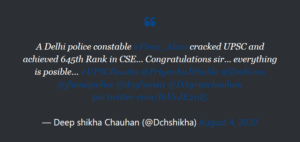
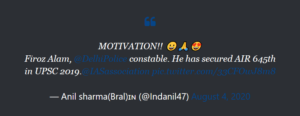
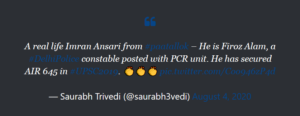
Five aspirants from the Delhi Police family have make it to the coveted team of Indian civil servants.
Apart from Alam, Vishakha Yadav, the daughter of ASI Raj Kumar posted in Dwarka district, and Navneet Mann, the daughter of Inspector Sukhdev Singh Mann posted with the vigilance unit, have secured 6th and 33rd all-India rank, respectively.
The inspiring success story of son of a taxi driver is also doing the round. Azharuddin Quazi cleared the IAS 2019 exam securing 315th rank.
Apart from Alam and Azharuddin, a total of 40 Muslim candidates have cleared this year’s UPSC examination.
Muslim candidates has registered a 40 per cent increase in the number compared to 28 candidates last year.
Civil Service aspirants from the Muslim community have been doing well and there is a progressive improvement in performance in the prestigious exams since 2016.
Until recently, they constituted only 2.5%. However in 2016, all previous records were broken when 50 Muslim candidates qualified for the UPSC with 10 making it to the top 100.
Courtesy: Siasat
New Delhi: Out of 829 candidates who cleared the Civil Services Exam – 2019 batch, 42 are Muslims. The number rose as compared to last year. 28 had cleared in 2018 batch.
However, in the 2016 batch, for the first time in history, 50 Muslims were selected through the UPSC, with 10 making it to the top 100. In the 2017 batch, too, 50 Muslims were selected through the exam.
In 2012, 2013, 2014 and 2015 batches, number of selected Muslims were 30, 34, 38 and 36, respectively.
Safna Nazarudeen, who ranked 45, has secured the highest rank among Muslim candidates. Safna is the only Muslim who is in top 100 this year.
“Since 2016, the percentage of Muslim candidates has remained around 5 per cent, which is a big feat, considering that, since Independence, this number was around 2.5 per cent,” said Zafar Mahmood of the Zakat Foundation, which grooms Muslim candidates for the UPSC.
“Out of the 42 candidates who have made it this year, 27 are from Zakat Foundation,” Mahmood said ti The Print.
“The realisation among the community to invest more in civil services came with the 2006 Sachar Committee Report, which documented the poor representation of Muslims in government jobs,” said Mahmood.
According to the report, at the time, just 3 per cent of IAS officers, 1.8 per cent of Indian Foreign Service (IFS) officers and 4 per cent of IPS officers were Muslims, even though the community comprised 13.4 per cent of the population at the time (2001 census), as reported by The Print.
“Since then, there has been a big change in the outlook of the community, and it has managed to bring the representation each year to 5 per cent,” Mahmood added. “However, considering the total percentage of Muslims in India is 15 per cent, we have to make three times the effort to bring the representation up,” he said.
Courtesy: Siasat
A businessman, Qadir Shaikh, has decided to set up an 85 beds Covid-19 facility to provide free treatment for the poor after he recovered from the novel coronavirus. He has converted his 30,000 square feet office space into an 85 beds Covid-19 hospital with oxygen facilities in Gujarat’s Surat city.
Talking to The Indian Express (IE), Shaikh said, “This hospital is for everyone, irrespective of caste, creed and religion. I was not born with a silver spoon in my mouth… I also faced financial problems in earlier days and I worked hard… now I am financially sound. So I thought of lending a helping hand to the needy during this global pandemic… My three sons and I have always helped poor people… Now I felt I should do something more… Hence the hospital”
Shaikh signed an agreement with the Surat Municipal Corporation (SMC) to supply medical staff and equipment at the facility with 15 ICU beds in Surat’s Adajan area. Surat Municipal Commissioner BN Pani and SMC Deputy Health Commissioner Dr Ashish Naik visited the premises and approved the proposal, IE reported.
Shaikh has named the facility after his granddaughter as Hiba Hospital. This has become ready and it was visited by SMC health department authorities on Tuesday. Dr Naik was quoted by IE, “We have seen the premises and found it appropriate. In the next few days, the hospital will start functioning with patients referred from New Civil hospital and SMIMER hospital”
The Surat Islam Yatim Khana Society has also written a letter to the district administration and municipal authorities seeking permission to start a Covid-19 hospital where mild to moderately symptomatic patients can be treated. The society had earlier started a quarantine centre on their premises and now with the help of an NGO, they want to start a dedicated Covid -19 hospital. On Monday, a team from the SMC and the district administration visited the campus and gave approval to the project.
Amroha: Khushboo Mirza, an AMU graduate, bags the honor of working as scientist at the Indian Space Research Organisation (ISRO). Mirza got promoted on June 25.
She worked with the development team of the Chandrayaan and Chandrayaan 2 and was honored by ISRO Team Excellence Award in April 2015.
Mirza completed her B.Tech in the year 2006 and joined Adobe Systems Incorporated as a software engineer for few months before getting recruited by ISRO.
According to wikibio, Khushboo Mirza’s father Sikander Mirza passed away when she was seven years old. Khushboo’s mother took over the business. The family hails from Amroha, Uttar Pradesh.
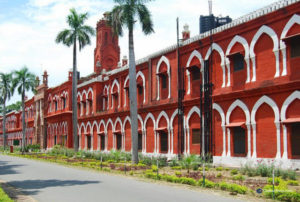
The Centre for Women’s studies, Aligarh Muslim University has revived its reputed journal ‘Women and Society’ by bringing out a special issue on ‘Issues of women of marginalized communities: Concerns about exclusion’. Professor Tariq Mansoor, Vice-Chancellor, AMU will release the journal on July 9, at 11:00 am via an online platform.
According to Professor Azra Musavi, Director, Centre for Women’s Studies, the special issue of the journal zeroes in on various issues plaguing the women of the marginalized communities. It carries research articles, field surveys and book reviews.
The online ceremony will feature response from a reputed scholar and a member of the editorial board of the Journal, Professor Shireen Moosvi, and responses from the contributors.
The founder Director, Centre for Women’s Studies, Prof Zakia Siddiqui will also speak, and Professor Nisar Ahmad Khan, Dean, Faculty of Social Sciences, will propose the vote of thanks.
Mumbai: Muslims in Ichalkaranji town of Maharashtra have donated a 10-bed ICU at a local hospital with Rs 36 lakh they collected in the form of Zakaat from the community members this Ramadan. The town is 380km from Mumbai.
Zakaat is the third pillar of Islam which makes it obligatory for Muslims to give 2.5% of their annual savings in charity.
ICU section of Indira Gandhi Memorial (IGM) Civil Hospital was inaugurated by Chief Minister Uddhav Thackeray on the day of Eid. Thackeray appreciated the community’s efforts and said via video conference: “Muslims in Ichalkaranji have shown the way for everyone in the country. The Muslim community has set an example on how to celebrate a festival.”
Samast Muslim Samaj (SMS), a Muslim organisation in Ichalkaranji, decided during the holy month of Ramadan to fund a 10-bed ICU facility at the town’s only government hospital as earlier patients needing ICU facility were sent to towns like Kolhapur and Solapur.
TOI quoted Dr Javed Bagwan, a surgeon associated with IGM Civil Hospital as saying, “This is a great gesture by the Muslims of this town. I don’t think anywhere else in India Muslims of an entire town have used the Zakaat money to fund such a facility in critical care. This will help us fight the coronavirus.”
Muslims comprise of 15% of the total three lakh population of Ichalkaranji town.